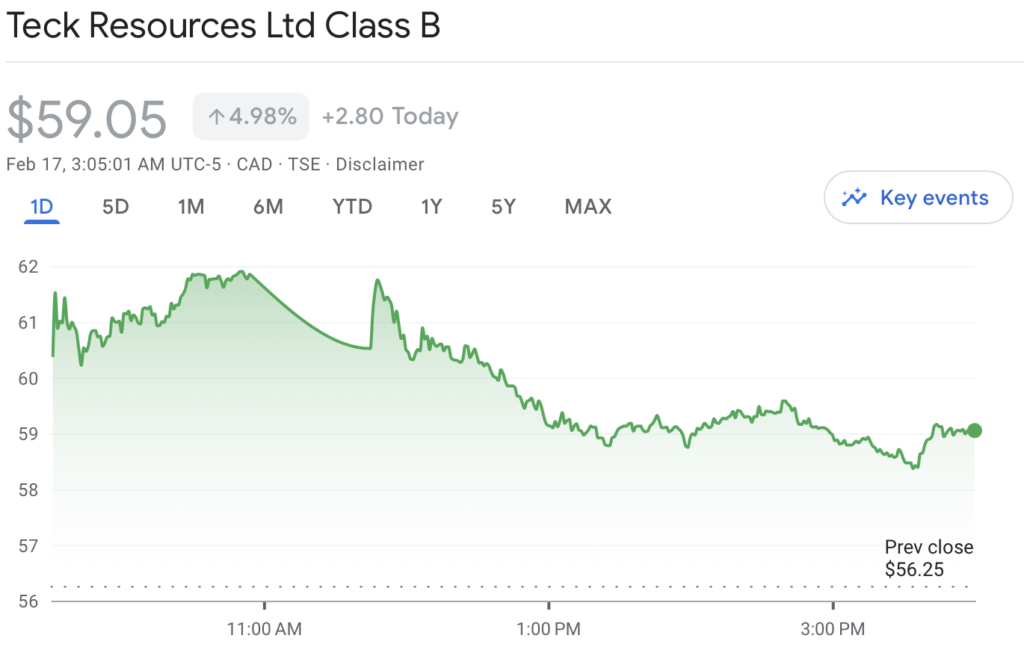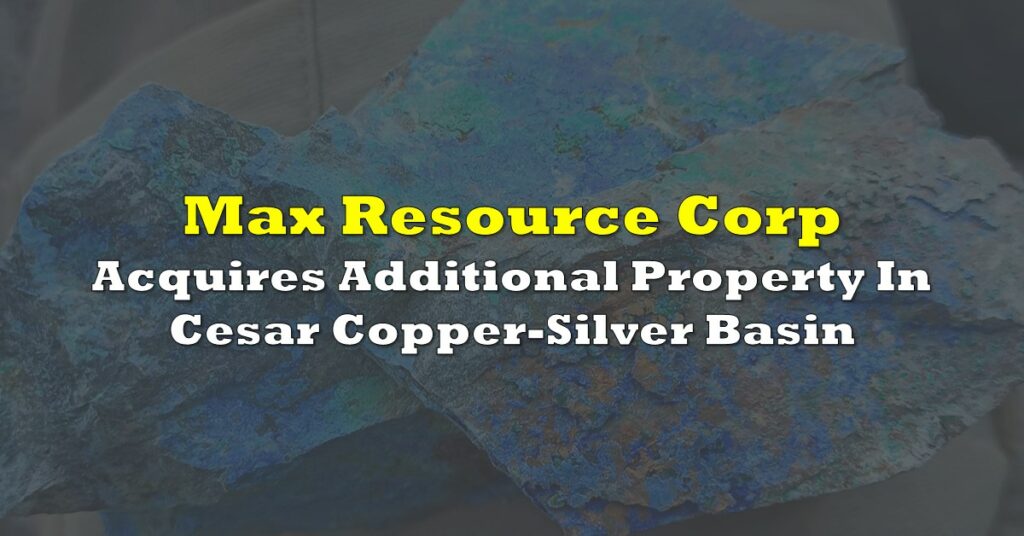As part of a strategic shift in base metal mining, Teck Resources (TSX: TECK.A, TECK.B) is considering a spin-off of its steelmaking coal segment or other alternatives to part with one of its major segments.
“At the request of the Investment Industry Regulatory Organization of Canada and the New York Stock Exchange, Teck Resources Limited today confirmed that it is evaluating alternatives for its steelmaking coal business, including the possible spin-out of an interest in that business to its shareholders,” the firm announced on Thursday.
The miner’s class B shares jumped as much as 7.8%–the highest intraday price in 12 years–before tapering down to a spike of 5% on the day following the news.

The firm made the statement as its respond to market rumors after it was reported that Teck would be announcing a “transaction” as first relayed by Bloomberg.
Analysts believe Teck’s coal operations might be valued up to $16 billion.
The firm however noted that “no decision has been reached to proceed with a transaction and there can be no assurances that any transaction will eventuate.”
Teck’s coal mines provide significant employment in southeastern British Columbia. Analysts believe Teck’s move to spin off its coal business as a separate entity underlines the reality that no mining firm is prepared to buy the division suitable to Teck.
Why not finance copper instead?
Teck made a significant investment in steelmaking coal in 2008 when it paid $14.1 billion for Fording Canadian Coal Trust. Several investors have soured on the business since then due to its greenhouse gas emissions, and the negative associations of coal in an ESG-focused investing environment.
The mining firm, however, has recently invested in huge copper mines in South America, utilizing revenue produced by its coal operations.
Observers are noting that the firm can utilize the spin-out to support its copper business in the long-run.
I’m praying that $teck isn’t spinning off the met coal and putting itself up for sale. Would help the price short term, but long term why not use the coal to finance copper mine development? It’s so hard to find decent copper assets and this is one. https://t.co/56TtDBOltI
— The Mining Bartender (@jtourzan) February 16, 2023
$TECK should then take the met coal business proceeds and use them to buy out smaller copper producers (non Chile/Peru?) while copper is still trading at $4/lb. https://t.co/mhOGzC2qI6
— Pauls Miklasevics (@BalticsNBeyond) February 16, 2023
In its preliminary 2022 production results, the firm reported producing 21.5 million tonnes of steelmaking coal, falling short of the firm’s guidance of 22.0 – 22.5 million tonnes. The firm meanwhile sees 2023 production for steelmaking coal landing between 24.0 – 26.0 million tonnes, same for 2024-2026.
Copper production landed at 270,500 tonnes, also falling short of the 273,000 – 290,000-tonne guidance. In 2023, however, the firm guides its copper production to 390,000 – 445,000 tonnes, and production is expected to increase to 545,000 – 640,000 tonnes in 2024-2026.
In its Q3 2022 financials, Teck reported a total of $4.67 billion in revenue, a jump from Q3 2021’s $3.97 billion. Steelmaking coal contributed $2.27 billion to the topline figure,an increase from last year’s $1.81 billion, while copper added $725 million – a decrease from last year’s $940 million.
Back in September, the firm announced an operational hiccup to its steelmaking coal operation in British Colombia, referred to as Elkview. The facility has seen certain structural failures that will take the facility offline for a period of time.
The downtime was then expected to reduce the plant’s annual steelmaking coal production by 1.5 million tonnes.
READ: Teck Resources Sees Steelmaking Coal Facility Halt Production Following Equipment Failure
BMO Capital Markets in December also supported the company’s push to continue re-investing its free cash flow from coal into copper production, as it believes the move will help the company attract ESG-focused investors. They believe that some ESG investors are warming up to investing in Teck after the announcement of their Fort Hill sale.
The firm posted a $222 million loss in Q3 2022 compared to a profit of $840 million in the previous year’s comparable period. This is heavily driven by a recorded a pre-tax impairment of $1.2 billion after Teck decided to sell its 21.3% interest in Fort Hills Energy and associated downstream assets to Suncor Energy for approximately $1 billion in cash.
Earlier this year, the firm also faced pushback from an organization called Save Elk River that has started an online petition to urge the British Columbia government to take action against the mining giant and order it to look into the impact of its coal mines on the Elk River.
Save Elk River alleges that the Elk River in the Elk Valley where Teck operates its open-pit coal mines has elevated levels of selenium and other contaminants coming from waste from the mines that has entered surface runoff and groundwater. The river is said to then carry the selenium and pollutants downstream into Lake Koocanusa and Kootenai River, and waters as far as Montana and Idaho.
Information for this briefing was found via Sedar, The Globe and Mail, and the sources mentioned. The author has no securities or affiliations related to this organization. Not a recommendation to buy or sell. Always do additional research and consult a professional before purchasing a security. The author holds no licenses.









Bank Of America Lowers Gold Price Target To $2000? – The Daily Dive feat John-Mark Staude
Returning to the Daily Dive today is that of John-Mark Staude of Riverside Resources (TSXV:...